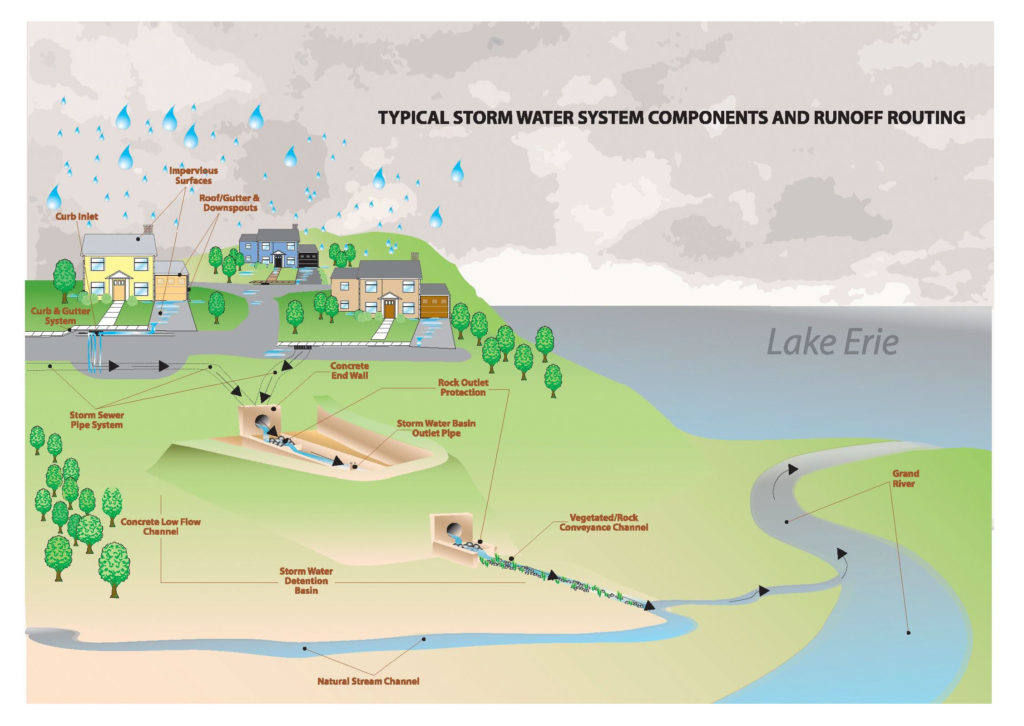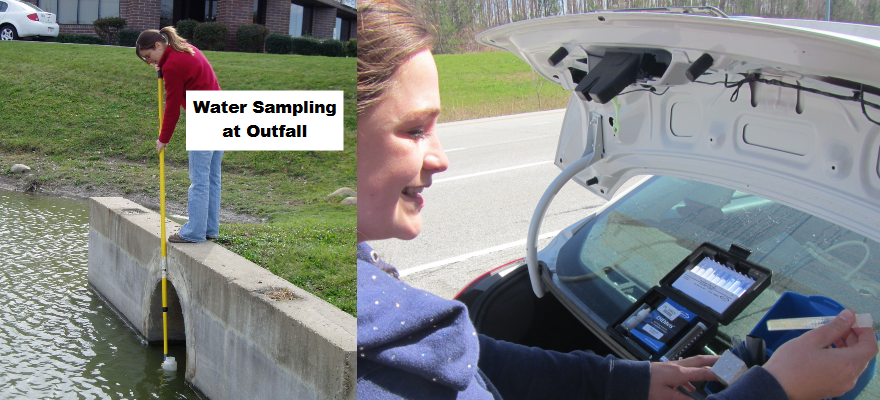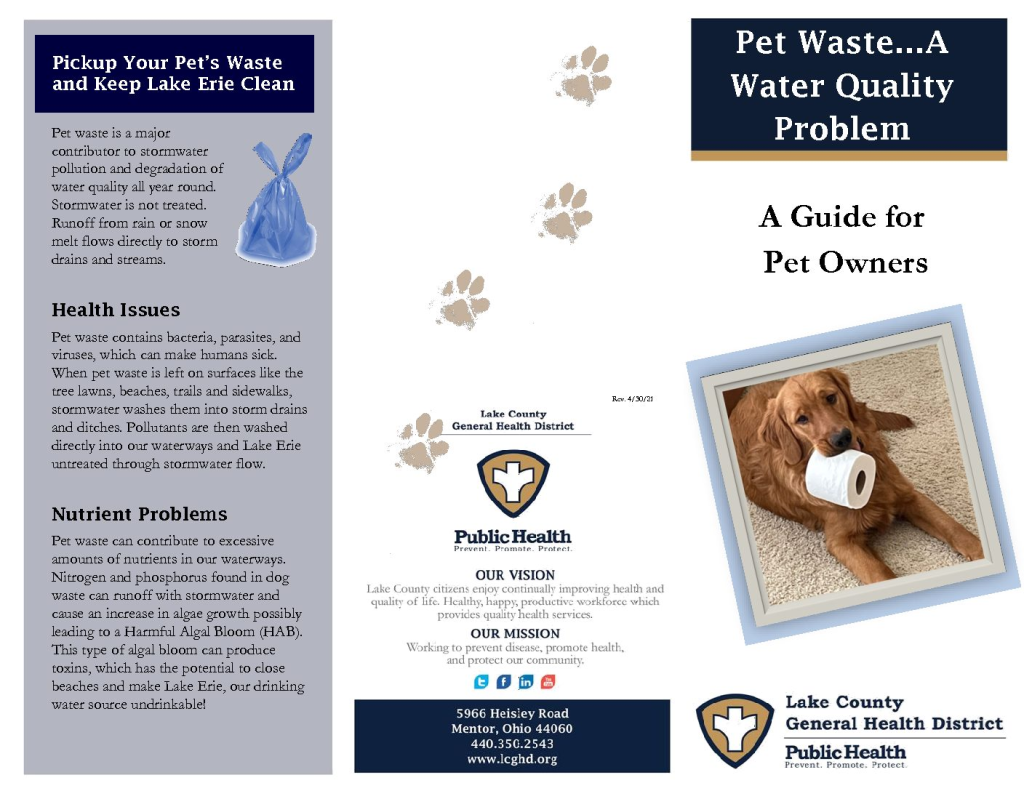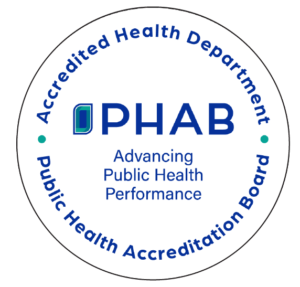What is Stormwater?
Rain, sleet, and snow melt flows from our roofs, lawns, and driveways into the street or into drainage ditches, where it enters the storm sewers through drains and catch basins. This water flows untreated through an outfall and directly into a stream or lake, carrying pollutants with it.

Lake County General Health District’s Role in Stormwater
The Lake County General Health District partners with the Lake County Stormwater Management Department (LCSMD) to help protect our rivers and lakes from pollutants that can enter the stormwater. The Health District performs outfall screenings where stormwater discharges to a waterway and investigates illicit discharges to stormwater systems.

During an outfall screening, a water sample is collected at an outfall and analyzed for a variety of components such as nitrates, phosphates, dissolved oxygen, and salinity. More information on outfalls and screening can be found at Stormwater Outfall Screening. Authority comes from Memoranda of Understanding with various agencies, Rules and Regulations, and local illicit discharge ordinances. Much of the structure for the rules and regulations comes from the Clean Water Act (CWA). For a summary of the CWA, and further information on laws, regulations, and enforcement, visit U.S. Environmental Protection Agency – Summary of CWA, Laws & Regulations. For local concerns in Lake County, discharges of pollutants should be reported to the Health District. Please continue to the tabs below to find more information on illicit discharges and details about the stormwater program.
Kristen Fink
Lead Registered Environmental Health Specialist
Phone: (440) 350-5833
Email: kfink@lcghd.org
Stormwater Program
What is the Stormwater Program?
Many bodies of water in the United States were not meeting water quality standards after the implementation of the Clean Water Act. The source of some of the remaining pollution was stormwater runoff. The U.S. Environmental Protection Agency (EPA) implemented a two-phased stormwater program to improve water quality. Phase I implemented the National Pollutant Discharge Elimination System (NPDES), which pertains to medium and large municipal separate storm sewers (MS4s). This phase issues NPDES permits to facilities and industries, allowing them to discharge wastewater up to a certain concentration of particular pollutants. The Phase II program covers MS4s in smaller, more urbanized areas, and helps eliminate and reduce pollutants in stormwater entering the storm sewers in your neighborhood. The Lake County Stormwater Management Department (LCSMD) ensures compliance with the Phase II program for its member communities. Funded by a stormwater user fee, the program and its partner agencies, including the Lake County General Health District, ensure compliance with all aspects of the stormwater permit and improve water quality.
Stormwater and the Community
Both the Health District and the Lake County Stormwater Management Department work to educate the community about stormwater and water pollution prevention by offering school presentations. They are also active at community events, such as the Lake County 4-H Fair. Publications and brochures can be found at local libraries and other public locations.
Visit www.lakecountyohio.gov/smd or call (440) 350-5900 to learn more information about stormwater systems and the Lake County Stormwater Management Department.
Illicit Discharges
What is an Illicit Discharge?
An illicit discharge is anything other than stormwater flowing into the storm sewers in the street and directly to our rivers and lakes. Many illicit discharges originate from households in urban areas and are pollutants that have major harmful effects once they enter rivers, lakes, and streams. The pollutants contaminate drinking water and destroy wildlife habitat.
Illicit discharge pollutants include:
- sediment
- grass clippings
- fertilizers
- pesticides
- pet waste
- litter
- road salt
- car washing soap
- motor oil
- antifreeze
- sewage from septic systems or leaking infrastructure
For more information on identifying an illicit discharge, view our Illicit Discharge Fact Sheet.
To report an illicit discharge, please complete our Contact Us form. Community Departments/Agencies please complete the Illicit Discharge Reporting Form.

Click or call the above number to report an emergency spill
Preventing Stormwater Pollution
Only you can prevent these pollutants from entering stormwater in your neighborhood. Be environmentally conscious, clean up your trash, pick up after your pets, only fertilize your lawn when necessary, and properly dispose of auto fluids. Visit the links below to learn more about how to prevent stormwater pollution.


Pet Waste – A Water Quality Problem
Keeping Streams Clean – Do Not Dump Near Waterways
Fertilizing – Nutrients for Lawns
Sewage – Keeping it Where it Belongs
Pools – Where to Drain Pools & Hot Tubs
Fall Leaves – Mulch, Compost, and Disposal
The Restaurant Industry – Keeping Stormwater Clean
Iron, Sulfur, and Manganese Bacteria in Water – Is it harmful?
Oil Free Please
Helpful Links & Resources
Helpful Brochures
Rain Gardens for the Home
Pet Waste… A Water Quality Problem
Rain Barrels
What Causes Foam in Streams & Lakes?
Stormwater-Related Links
Lake County Stormwater Management Department
Ohio Lake Erie Commission
Ohio Stormwater Association
Chagrin River Watershed Partners
Friends of Arcola Creek
Handle Your Grease
Healing Our Waters – Great Lakes Coalition
Lake County OSU Extension Office
Lake County Soil and Water Conservation District
NEOPIPE
Northeast Ohio Areawide Coordinating Agency (NOACA) – Water Quality
Ohio Environmental Protection Agency (EPA) – Division of Surface Water
Ohio Watershed Network
U.S. Environmental Protection Agency (EPA) – Water Topics
Water Management Association of Ohio
Workshops
Rain barrels are available for purchase at the Lake County Soil and Water Conservation District for $70. Rain barrel workshops are also hosted throughout the year, where you will receive all of the parts to complete a barrel and have access to the necessary tools. The cost of these workshops is determined by the location host, typically $60 or $65.
For more information on purchasing a rain barrel through Lake County Soil and Water Conservation District, CLICK HERE or call (440) 350-2730.

